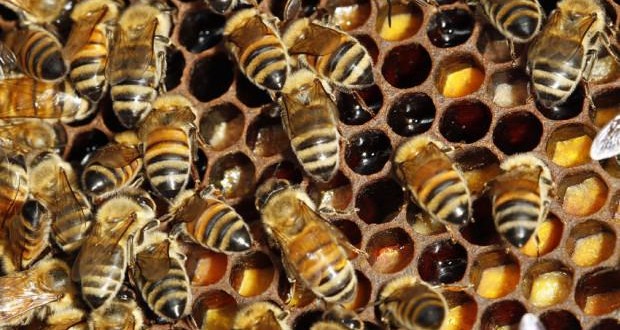Advanced genomic tools being developed at the University of British Columbia will enable beekeepers to breed a made-for-Canada honeybee better able to resist pests and disease, according to molecular biologist Leonard Foster.
Foster and co-leader Amro Zayed of York University will analyze the genetics of 1,000 bee colonies from across the country looking for a dozen traits that help western honeybees survive and thrive in Canadian conditions.
Their project has been awarded $7.3 million in joint government-industry funding.
“It is very clear that we have to develop innovative solutions for bee health because bee declines will have serious consequences for Canada’s economy and food security,” says Zayed in the Department of Biology, Faculty of Science.
Honeybees produce 75 million pounds of honey each year and are responsible for pollinating many fruits and vegetable crops, nuts and oil seeds like canola. Through these activities, they contribute more than $4.6 billion to the Canadian economy each year. But the health of honey bees in Canada has been declining, with many beekeepers reporting high annual losses over the past decade.
The research team will apply a state-of-the-art tool for studying human health to honeybees. “Our group has recently shown that you can predict the behaviour of specific colonies by knowing their genetics. We no longer have to spend a lot of time and effort observing colonies to determine if they are going to be healthy or not,” says Zayed.
The team will identify genomic and proteomic markers to selectively breed 12 economically valuable traits. This will enable beekeepers to quickly and cost-effectively breed healthy, disease-resistant, productive bee colonies that are better able to survive harsh Canadian winters.
As this will not eliminate the need to import bees from other regions, the team will also develop an accurate and cost-effective test to detect bees with Africanized genetics. This new test will improve on an earlier version developed jointly by the Zayed team and researchers from the University of Sydney. By the end of the project, the research team will ensure the new tools are implemented and accessible to beekeepers.
The project is expected to provide measurable economic benefits to Canada, including to beekeepers and the agri-food industry, from $8 million to $150 million per year.
The research, led by Genome BC and Ontario Genomics, will serve as a road map for improving honeybee health across the globe. The project is being funded through Genome Canada’s 2014 Large-Scale Applied Research Project Competition: Genomics and Feeding the Future. Other funding partners include Genome Alberta, Genome Quebec, the University of British Columbia, the BC Ministry of Agriculture and the BC Honey Producers Association.
Agencies/Canadajournal
 Canada Journal – News of the World Articles and videos to bring you the biggest Canadian news stories from across the country every day
Canada Journal – News of the World Articles and videos to bring you the biggest Canadian news stories from across the country every day




I just read your article on “genetically modified bees” and thought you should be aware of this company.
They use bees natural pollinating abilities to distribute plant control material with special hives. It is safe
for the bees, good for the environment (uses no water run off) and saves farmers money as they only need
to use 20% of the current material they use for crop protection.
http://www.beevt.com
I might be missing something but this could be a real Canadian find. They trade on the TSXV so it shows
some legitimacy. I would like to know your thoughts, Steve